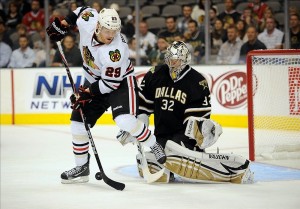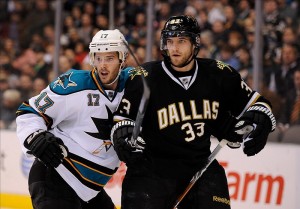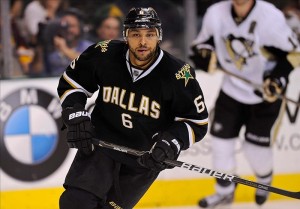When a professional hockey team doesn’t make the playoffs, fans, local media and hockey analysts will play the blame game—it’s just human nature. Such is the case pertaining to the Dallas Stars.
And to that I say, give credit where credit is due: the Stars defensive corps are at the top of my blame list.

In its defense (no pun intended), the defensive corps isn’t the only reason the Stars missed the playoffs for a fifth consecutive year, but just review the defensive corps’ performance. They don’t defend the crease, they have trouble transitioning the puck out of their zone and they are constantly out of position. Here’s a look at how the starters and reserves graded out:
Stephane Robidas – Grade: C-
No doubt, Robidas is a warrior with a lion’s heart. Still, this is a guy who early in his Stars tenure was an occasionally used number six and sometime booted up to left wing. As the elder statesman of the group, he is what he’s always been…a serviceable number five or six. Poor trades and the overall diminishment of the defensive corps over time vaulted him into the number one slot and he’s not that guy.

Alex Goligoski – Grade: F
Poor Alex was immediately thrust into the hot seat when traded for James Neal and Matt Niskanen. Goligoski hasn’t shown consistent scoring prowess or the ability to quarterback the power play. Moreover, he is incapable of defending his own zone. Too many times he is out of position and doesn’t play with a hint of physicality. Opposing forwards know they can crash the crease at will when “Goose” is on the ice.

Trevor Daley – Grade: D-
The club signed Daley long-term, but he’s proven to be nothing more than a streaky player. Like Goligoski, he is a hindrance in his own zone. He’s got speed, but is prone to turnovers and makes too many mistakes in front of goalie Kari Lehtonen.
Brendan Dillon – Grade: B+
As a rookie, Dillon outshined his peers as the sole physical presence on the back end. He also showed the ability to hit a second gear and carry the puck deep into the offensive zone. He appeared to lose steam late in the season, but this is a kid the Stars pencil in as a solid third or fourth with potential to be the top dog someday.
Philip Larsen – Grade: C
A small statured player with a game based on speed and offensive potential. Asking the young guy (who looks like he’s 14) to play that game fits his tools, but he has no authoritative presence in his own zone. Defensemen generally take longer to develop and adapt to the NHL than do forwards, but Larsen had plenty of chances and didn’t show he’s on an upward trend.
Jordie Benn – Grade: D
Presumably, Nieuwendyk cleared out veterans Sheldon Souray and Mark Fistric before the season to make way for the youngsters’ development. In the case of Benn, that backfired. Benn proved he needs more seasoning, maybe much more, at the AHL level. In the season finale against Detroit, Benn played a large portion of the third period and proved he’s just not ready for the NHL.
Jamie Oleksiak – Grade: Incomplete
The towering rookie didn’t get nearly as many chances as Larsen or Benn. When he did, he played like a deer in headlights. Not surprising since he’s only 20 and probably in need of more AHL time, but his presence as a 6’7” defender would suggest he could and should play nastier than he did.
Aaron Rome – Grade: C+
Rome dealt with injuries and healthy scratches for much of the campaign but when he did play, he was serviceable. He displayed some physicality and smarter play in his own zone than most of his teammates. He can be a good fit as a five or six, but the Stars already have several of those on the roster.
Mike, like your work but I think you;’re a little hard on Robi/Goose.
– At least 25 teams would like Robidas in their top 4, you call him a 6th D.
– Goose was terrible but never as bad as an F.
You’re going to have a hard time facing these guys in the locker room if they see this strange report.
Mike, like your work but I think you;’re a little hard on Robi/Goose.
– At least 25 teams would like Robidas in their top 4, you call him a 6th D.
– Goose was terrible but never as bad as an F.
You’re going to have a hard time facing these guys in the locker room if they see this strange report.
Goligoski an F? That’s crazy. B- or C+ at worse. He was on pace for a 50 point season. I’ll take that anyway.
Goligoski an F? That’s crazy. B- or C+ at worse. He was on pace for a 50 point season. I’ll take that anyway.
Goligoski an F? That’s crazy. B- or C+ at worse. He was on pace for a 50 point season. I’ll take that anyway.
I hope you didn’t get paid to write this. First, it is the height of laziness to not mention even one statistic in this piece. You didn’t just ignore CORSI, you also ignored +/- and even points. Moving on to Robidas, is your premise that he is playing a role that greatly exceeds his ability? He is the number one guy when he should be a five or six? I have no idea what sort of grading system could give Robidas a C- if he is playing tough minutes on the top pairing WITH A ROOKIE, has the ability of a third pairing guy, and is not crashing and burning every night. Your description of Robidas’ early tenure with the Stars adds nothing to your argument at all; in fact it nicely sets up the argument that he deserves a B or higher because of the results he gets despite his limits. But hey, that doesn’t fit your nonsense thesis, so just make stuff up. Goligoski is a different case, he had some real ups and downs this season. If you want to give him an F because that fits your illogical thesis, be my guest, but some evidence might be nice. Why not mention one of his awful turnovers that led to a goal? There were several to choose from and some imagery might be nice to make your point. Or maybe the fact that he was tied for 9th in points for defensemen? In what universe does a player on pace to score 40 in a full season deserve the F you gave him? On defense he might deserve that F, but the offense he brings certainly bumps up his grade to a C. Instead, you chose to bring up the Neal trade and complain that an offensive defenseman isn’t a defensive defenseman. Finally it might be interesting to think about how the defense might be responsible for the improvement on the power play from worst in the NHL in 30 years last season to almost middle of the pack this season. Do any defensemen deserve credit for that improvement? Your article totally ignores that idea because it might require some research or thought instead of lazy writing. Your bio says you have been writing for 10 years, but I don’t think this piece is evidence of that since it took me 10 seconds to see you wrote it in 10 minutes. Get a clue.
I hope you didn’t get paid to write this. First, it is the height of laziness to not mention even one statistic in this piece. You didn’t just ignore CORSI, you also ignored +/- and even points. Moving on to Robidas, is your premise that he is playing a role that greatly exceeds his ability? He is the number one guy when he should be a five or six? I have no idea what sort of grading system could give Robidas a C- if he is playing tough minutes on the top pairing WITH A ROOKIE, has the ability of a third pairing guy, and is not crashing and burning every night. Your description of Robidas’ early tenure with the Stars adds nothing to your argument at all; in fact it nicely sets up the argument that he deserves a B or higher because of the results he gets despite his limits. But hey, that doesn’t fit your nonsense thesis, so just make stuff up. Goligoski is a different case, he had some real ups and downs this season. If you want to give him an F because that fits your illogical thesis, be my guest, but some evidence might be nice. Why not mention one of his awful turnovers that led to a goal? There were several to choose from and some imagery might be nice to make your point. Or maybe the fact that he was tied for 9th in points for defensemen? In what universe does a player on pace to score 40 in a full season deserve the F you gave him? On defense he might deserve that F, but the offense he brings certainly bumps up his grade to a C. Instead, you chose to bring up the Neal trade and complain that an offensive defenseman isn’t a defensive defenseman. Finally it might be interesting to think about how the defense might be responsible for the improvement on the power play from worst in the NHL in 30 years last season to almost middle of the pack this season. Do any defensemen deserve credit for that improvement? Your article totally ignores that idea because it might require some research or thought instead of lazy writing. Your bio says you have been writing for 10 years, but I don’t think this piece is evidence of that since it took me 10 seconds to see you wrote it in 10 minutes. Get a clue.